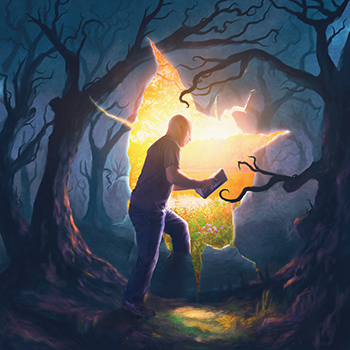
In 2014, I began writing fiction for two UK publishers under different pen names and in different genres. As part of my new professional practice, I would read articles by industry professionals, and one of those articles has stayed with me, written by fiction editor Shawn Coyne[i]. He described how various genres of fiction gained and lost popularity, but the one genre he believed was the story form for our time was the thriller.
He argued that thrillers are commercially successful because they boil down our modern experience to a psychological core that every person can understand. We are inundated with psychically damaging messages: “we’re too fat, we’re ugly, we’re low class, we’re not cool, we’re lazy, we’re never going to make it”. On top of those assaults are prescriptive solutions to overcoming our inadequacies: go on a diet, join a gym, go to uni, wear new clothes, take this seminar. They are targeted to us every single day, hour and minute.
We are told there are threats around every corner: the stranger, the terrorist, the despotic leader, climate change. Those in positions of authority are failing us. Mass and social media is a fear factory churning out content like no other time in history.
What underlies all of these messages? We’re not safe!
To make matters worse, we all live alone. We belong to no protective tribe. The nuclear family is a couple or just one parent with a kid or two or three. There just doesn’t seem to be any way to navigate the world without feeling in one way or another victimised by forces beyond our control.
To find our way in this chaos, we seek stories that give us hope and faith that we can persevere.
Coyne argues that long-form stories in novels that do not sugar-coat reality or simplify success help satisfy our need for order. Because we often feel like we have no impact on the world and are treated by the powerful as consumption machines to be programmed by the latest algorithms, we identify deeply with thriller protagonists.
The thriller is all about one individual negotiating a complex world, living it to the limits of human existence and usually triumphing over seemingly overwhelming forces of antagonism.
Isn’t this a description of what we often feel we are up against every day? We love thrillers because they reassure us that there is an order to the world and one person can make a difference. When we leave a great movie thriller or finish a great thriller novel, we have a catharsis. The experience purges our gloom and gives us reinforcement to stay the course.
Coyne's analysis of the thriller genre resonated with me. The tenacity of a Jack Reacher or the wisecracks of a John Dortmunder (both novel protagonists) do give me a psychological boost when I'm having a life struggle.
 I've noticed a similar consolation while at Mass, usually during one of the readings. I’m astounded how often the story of Peter walking on the water suddenly pierces as a metaphor into some aspect of my life. I may have been ruminating over some personal problem, but Peter's experience is a slap to the forehead. Instead of keeping my eyes on Jesus, I've been staring at the waves and feeling overwhelmed, catastrophising myself into some future disaster.
I've noticed a similar consolation while at Mass, usually during one of the readings. I’m astounded how often the story of Peter walking on the water suddenly pierces as a metaphor into some aspect of my life. I may have been ruminating over some personal problem, but Peter's experience is a slap to the forehead. Instead of keeping my eyes on Jesus, I've been staring at the waves and feeling overwhelmed, catastrophising myself into some future disaster.
How is it that a protagonist in a thriller novel or an apostle trying to survive a storm suddenly breaks the pattern of my own thoughts? According to Louise Rosenblatt's transactional theory of reading[ii], this is one aspect of the reading experience.
At one end of the reading experience, we have the shared and accepted public meaning of a text. This includes the intentions of the author. For Scripture, this is the accepted interpretation given by the Church. This interpretation continues to evolve, but it's an inherited meaning from tradition that we continue to build on.
At the other end of the reading experience, meaning is derived as an aesthetic experience. The reader, or the listener at Mass, pays attention and savours the qualities of feelings, ideas, situations, scenes, personalities and emotions that are provoked during the reading. These nuanced meanings are often specific to the individual and their life experiences.
That's what Coyne's article helped me appreciate about the "personal application" of Scripture and of any surprising insight from a line of dialogue or heroic character in a work of fiction.
Of course, no contemporary work of popular culture will ever reach the status or authority of the Bible and Church tradition, but often they do echo similar ideas and encouragements from that fountain. Jesus truly is the water of life, and reading is a gift that connects us to a wider world through that aesthetic experience.
We’re not always at Mass and we’re not always reading Scripture, but when we're interacting with contemporary entertainment, you never know when God will interrupt a negative thought pattern and remind us to take courage; we're in the palm of his hand.

Marcus Amann lives in Canberra and previously worked for the National Centre for Evangelisation. He is currently working on a supernatural thriller and enjoys playing bluegrass banjo.
[i] Shawn Coyne: https://storygrid.com/about/
[ii] Rosenblatt, Louise. The Reader, the Text, the Poem: The Transactional Theory of the Literary Work. Carbondale: Southern Illinois University Press, 1978.
Images: Lightstock
Words: Marcus Amann
Previous articles for the NCE:
We’re inside God’s story
Helping the poor is foundational



